| |
| July
2006 |
Ballard
Canyon : a Photo Journal |
|
|
The
Santa Ynez Valley evokes several
winery names to those familiar with the area - or anyone
who has seen the movie "Sideways," for that matter.
From the cool foggy Santa Rita Hills in the west to the
more arid climate of Happy Canyon in the east, the Santa
Ynez Valley is able to provide hospitable growing conditions
to several varieties of grapes - all due to the varying
climates and soils. While the new Sta. Rita Hills AVA has been making a name for itself
with the potential for world class Pinot Noir,
there are a few additional growing areas in the valley that
have been quietly zeroing in on nirvana for other varieties
of grapes. Ballard Canyon is one of those areas on the brink of becoming something big.
Ballard Canyon is bisected by a 6 mile-long two-lane road
that runs north-south, just to the east and roughly parallel
to Hwy 101. Connecting Buellton (at Hwy 246) and Los Olivos
(at Hwy 154), this area is home to some of the finest vineyards
on the Central Coast. Although relatively flat and wide
at the south end, the canyon narrows substantially at its
north end, and one has to climb over 1,000 ft. to arrive
in Los Olivos. Part of the fascinating landscape here is
that there are several of these small canyons running north-south
- in contrast to the mountain ranges that form the transverse
east-west Santa Ynez Valley.
Organized
by winemaker Tim Grubb (Departure Wines), this tour featured
stops at Tierra Alta, Stolpman, and Purisima Mountain, finishing with lunch at Larner
vineyards. At each point, we were able to hear directly
from the grower or vineyard manager exactly what makes Ballard Canyon so special.
|
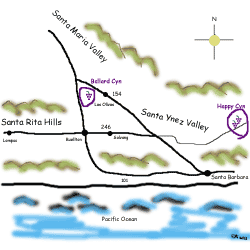 |
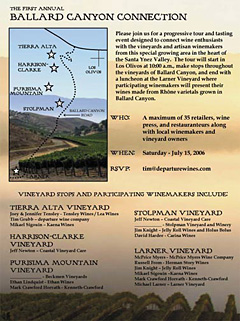 |
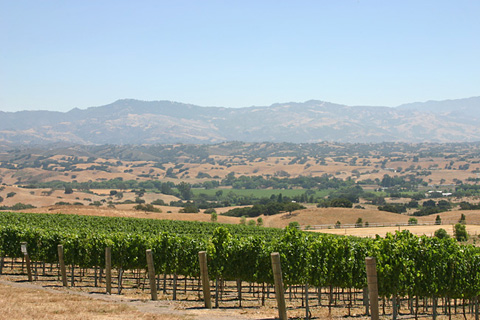 |
| |
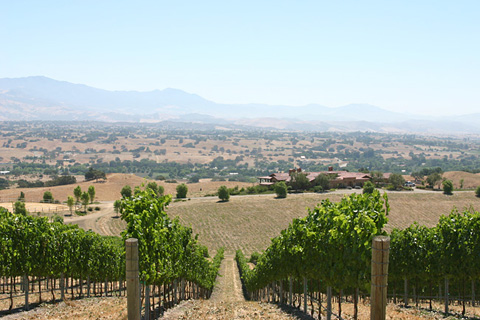
|
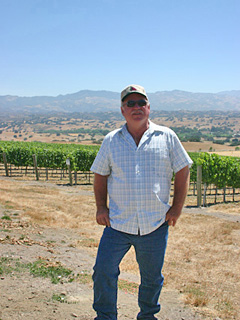 |
Above
: several views of Tierra Alta Vineyard,
looking both east (top right) and south (middle). Above
Right
: vineyard manager John Belfy, of Buona Terra Farming (Ashley's,
Rio Vista, and Huber).
We all met in Los Olivos. In order to reduce the car traffic to the vineyards, as well as the dust
(it attracts the mites and hoppers), Tim had arranged to have us travel in two 15 passenger vans. Slipping by Mattei's Tavern, we swung south, driving up the steep road leading to the canyon. First stop, Tierra Alta Vineyard, just on the other side of the hill, and across from Windmill Vineyard. Here, we met with John Belfy, who led us up one of the vineyard roads with a view of vineyard and beyond.
John Belfy explained that Tierra Alta is all on vertical trellising, with movable catch wires. One of the steeper vineyards located in the Ballard Corridor,
Tierra Alta was planted in 2000 to Tablas Clone 99 of Syrah. Additional varieties include: grenache, sauvignon blanc, and a small amount of tempranillo. The fruit
has been cropped to levels of about 1.7 ton per acre. Things like leaf pulling are done by hand,
though the vineyard is mechanically hedged and topped to reduce vigor before veraison arrives. All of the Sauvignon Blanc goes to Brander.
Tim Grubb's Departure Wines uses fruit from an area affectionately called the
"vegetable garden." Joey Tensley spoke about his 3ac parcel, and mentioned that he spends a little more in fees to keep the crop down
in the top half of the section - primarily to make what he refers to as "feminine wines, but with nice fruit and backbone." The bottom
half of the Tensley section is more vigorous. This fruit
goes to Joey's wife, for use in her Rose. The top of the section ripens
a week ahead of bottom, so it gets picked earlier. Additional people using fruit from this vineyard include: Kaena (grenache),
Blair Fox (syrah). According to John, the vineyard "owner
doesn't make wine, just wants to drink wine" and sell
fruit.
From here, we piled back into the vans and headed south a bit to meet with Jeff Newton at Stolpman Vineyards.
|
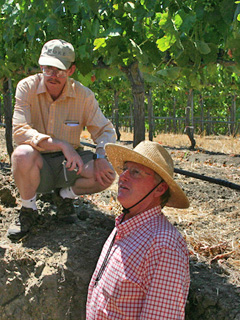 |
|
|
|
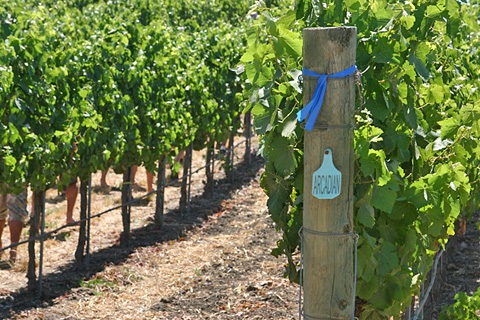 |
|
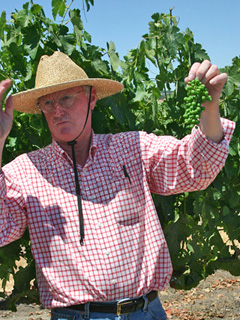 |
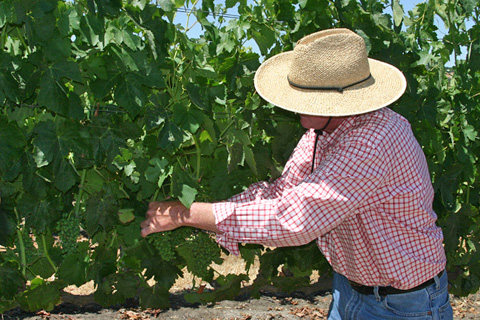 |
Above
: several views of Stolpman Vineyards, with Jeff Newton -
Coastal Vineyard Care Associates (Harrison-Clarke, Rusack, Jonata,
Wilkening).
We travelled down the road just a bit to Stolpman
Vineyards, meeting up with Jeff Newton. Jeff acknowledged that this area is probably best known for its syrah, but felt that it was also producing some "phenomenal
grenache," as well sangiovese. In fact, he seemed particularly excited about the sangiovese, and has been working with Alberto Antonini - who, according to Jeff, was nearly as excited as he was. Interestingly, Jeff's confirmation about the soils in this area came from yet another variety - chardonnay! Apparently, he noticed the Chardonnay at
Wilkening Vnyd did much better than it should, and found out that the limestone veins in the area translate to superior soils for the vines. Here's an interesting bit of trivia: back in the early '90s, Jeff spent some time with the Perin Family (Ch. Beaucastel)
looking at this same property for sale to them. Ultimately
they chose to locate in Paso Robles (Tablas Creek), but they looked here first. Jeff then recommended to Tom Stolpman that he buy
it - he did, and they started planting in 1992 on all phyloxera-resistant
rootstalk at the time. Since then, they have experimented with several additional rootstalks.
Jeff had gone all out for us, bringing in a backhoe to dig a pit so we could a cross-section of the soils. He climbed into the pit to illustrate the limestone strata run
from southern Monterey county through westside Paso and into
parts of Santa Ynez Valley. Limestone has a high ph, and this is planted
on rootstalk that is resistant to limestone-induced iron deficiency
(110R, a cross of two American species). Ordinary soil about
ph6 - the soil here is ph8. The Stolpman syrah
is sold by acre, at about $7500-8500/acre. This particular block is being sold by acre
to a new label (Sangue?) - Jeff says that the attention
to detail this fellow is paying for should result in satisfying his goal of achieving a highly rated
wine. Shoot density here is 2-1/2 shoots/ft, and they use clips on the wires to keep
the shoots parallel, with same number of clusters per shoot.
Jeff told us they have abandoned the leaf pulling on the syrah - but eliminate
laterals which are growing out of the fruit zone, giving the
clusters diffuse light. About 2 tons/acre right here. They also clip
the wings off the clusters, to help eliminate the potential for
green flavors. Whe the vineyard is at about 80% veraison, they do a "green
drop." Originally, Stolpman Vnyds was more about selling the fruit, but are now focusing
more on making wines. Winemaker Sashi Moorman, previously worked at Ojai, and has been here about 5 yrs. Not coincidentally, there have been many changes since then, such as tearing out
10'rows x 6'vines rows, and replanting to higher density of 6'rows
x 3'vines. They have also been working with Alberto Antonini as a consultant. Interestingly, Michel Rolland is consultant on a nearby vineyard
(Jonata - owned by the Screaming Eagle people) and has also remarked that the sangiovese here was amazing.
Final thoughts by Jeff - well, he thinks that Ballard Cyn may have its own AVA someday. And, if this seems a little far-fetched, don't forget about those folks in the Sta. Rita Hills. From here, we piled back into the vans and headed for our rendezvous with Steve Beckmen, at his Purisima Mountain Vineyard.
|
|
|
| |
|
|
| July
2006 |
Ballard Canyon : a Photo Journal |
|
|
|
|
| |
|
|
| |
Copyright
© 2006, Eric Anderson - All rights reserved
No original material may be reproduced without written consent
Mail & Comments
- Eric Anderson
Last
Update 9.18.06
|
|
|